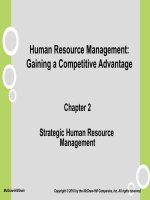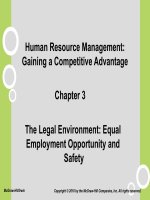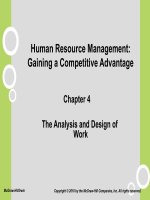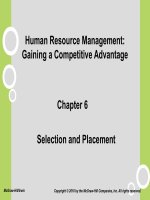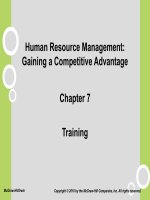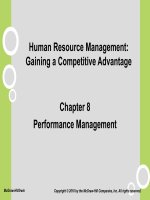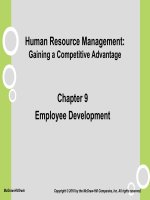HRM gaining a competitive advantage chapter 005 3rd ed
Bạn đang xem bản rút gọn của tài liệu. Xem và tải ngay bản đầy đủ của tài liệu tại đây (435.65 KB, 19 trang )
Part II
Acquisition and
Preparation of Human
Resources
Standard Slide Sample
Chapter 5
Human Resource Planning and Recruitment
Chapter 6
Selection and Placement
Chapter 7
Training
Irwin/McGraw-Hill
© The McGraw-Hill Companies, Inc., 2000
5
Human Resource Planning
Chapter and Recruitment
Objectives
Irwin/McGraw-Hill
• Discuss how to align a company’s strategic direction
with its human resource planning.
• Determine the labor demand of workers in various job
categories.
• Discuss the advantages and disadvantages of various
ways of eliminating a labor surplus and avoiding a labor
shortage.
• Describe the various recruitment policies organizations
adopt to make the job vacancies more attractive,
• List the various sources from which job applicants can
be drawn, their relative advantages and disadvantages,
and methods for evaluating them.
• Explain the recruiter’s role in the recruitment process,
the limits the recruiter faces, and the opportunities
available.
© The McGraw-Hill Companies, Inc., 2000
Stages in Human Resource
Planning
5-2
Irwin/McGraw-Hill
Forecasting
Forecasting
LaborDemand
Demand
Labor
LaborSupply
Supply
Labor
GoalSetting
Settingand
and Strategic
Strategic Planning
Planning
Goal
ProgramImplementation
Implementationand
and Evaluation
Evaluation
Program
© The McGraw-Hill Companies, Inc., 2000
Forecasting Stage of Human
Resource Planning
5-3
DeterminingLabor
LaborDemand
Demand
Determining
derived from
fromproduct
product//service
service demand
demand
derived
external in
innature
nature
external
DeterminingLabor
LaborSupply
Supply
Determining
internal movements
movementscaused
caused by
bytransfers,
transfers,
internal
promotions,turnover,
turnover,retirements,etc.
retirements,etc.
promotions,
transitionalmatrices
matricesidentify
identifyemployee
employee movements
movements
transitional
overtime
time
over
usefulfor
forAA
AA// EEO
EEOpurposes
purposes
useful
DeterminingLabor
LaborSurplus
Surplusor
orShortage
Shortage
Determining
Irwin/McGraw-Hill
© The McGraw-Hill Companies, Inc., 2000
Strategies for Reducing an
Expected Labor Surplus
5-4
Speed
Extent of
Human Suffering
1. Downsizing
Fast
High
2. Pay reductions
Fast
High
3. Demotions
Fast
High
Strategy
Irwin/McGraw-Hill
© The McGraw-Hill Companies, Inc., 2000
Strategies for Reducing an
Expected labor Surplus
5-5
Speed
Extent of
Human Suffering
1. Downsizing
Fast
High
2. Pay reductions
Fast
High
3. Demotions
Fast
High
4. Transfers
Fast
Moderate
5. Worksharing
Fast
Moderate
Strategy
Irwin/McGraw-Hill
© The McGraw-Hill Companies, Inc., 2000
Strategies for Reducing an
Expected Labor Surplus
5-6
Speed
Extent of
Human Suffering
1. Downsizing
Fast
High
2. Pay reductions
Fast
High
3. Demotions
Fast
High
4. Transfers
Fast
Moderate
5. Worksharing
Fast
Moderate
6. Retirement
Slow
Low
7. Natural attrition
Slow
Low
8. Retraining
Slow
Low
Strategy
Irwin/McGraw-Hill
© The McGraw-Hill Companies, Inc., 2000
Strategies for Avoiding an
Expected Labor Shortage
5-7
Strategy
Speed
Reversibility
1. Overtime
Fast
High
2. Temporary employees
Fast
High
3. Outsourcing
Fast
High
4. Retrained transfers
Slow
High
5. Turnover reductions
Slow
Moderate
6. New external hires
Slow
Low
7. Technological
innovations
Slow
Low
Irwin/McGraw-Hill
© The McGraw-Hill Companies, Inc., 2000
Reasons for Downsizing
5-8
Need to
to reduce
reduce labor
labor costs
costs
Need
Reducedneed
need for
forlabor
labor due
due to
to technology
technology
Reduced
Reducedneed
need for
forprofessional
professionalstaff
staff due
dueto
to
Reduced
mergers
mergers
Changesin
infacility
facilitylocations
locations
Changes
Irwin/McGraw-Hill
© The McGraw-Hill Companies, Inc., 2000
Reasons for Downsizing NOT
Living Up to Expectations
5-9
Irwin/McGraw-Hill
Long-termnegative
negativeeffect
effectwhen
whenimproperly
improperly
Long-term
managed
managed
Lossof
ofvalued
valued human
human assets
assets
Loss
Survivorsbecome
becomenarrow-minded
narrow-minded and
and
Survivors
risk-adverse
risk-adverse
© The McGraw-Hill Companies, Inc., 2000
5-10
Advantages of
Employing Temporary Workers
Increases organizational
organizational flexibility
flexibility
Increases
Acts as
as aa source
source of
of permanent
permanent
Acts
hires
hires
Reduces training
training and
and orientation
orientation
Reduces
costs
costs
Brings objective
objective (outside)
(outside)
Brings
perspective to
to firm
firm
perspective
Irwin/McGraw-Hill
© The McGraw-Hill Companies, Inc., 2000
Disadvantages of
Employing Temporary Workers
5-11
Tension between
between “temps”
“temps” and
and
Tension
full-timers
full-timers
Outsourcing can
can have
have long-term
long-term
Outsourcing
negative consequences
consequences
negative
Irwin/McGraw-Hill
© The McGraw-Hill Companies, Inc., 2000
Recruitment Activities
5-12
Are designed to affect :
Irwin/McGraw-Hill
Numberof
ofapplicants
applicants
Number
Typeof
ofapplicant
applicant
Type
Thoselikely
likelyto
toaccept
acceptposition
positionifif
Those
offered
offered
© The McGraw-Hill Companies, Inc., 2000
The Human Resource
Recruitment Process
5-13
Decisions are made in 3 areas :
Irwin/McGraw-Hill
PersonnelPolicies
Policies
Personnel
RecruitmentSources
Sources
Recruitment
RecruiterCharacteristics
Characteristics
Recruiter
© The McGraw-Hill Companies, Inc., 2000
Overview of the Individual Job ChoiceOrganizational Recruitment Process
5-14
JOB CHOICE
Vacancy
Vacancy
Characteristics
Characteristics
Personnel
Policies
Irwin/McGraw-Hill
Applicant
Applicant
Characteristics
Characteristics
Recruiter
Characteristics
Recruitment
Sources
© The McGraw-Hill Companies, Inc., 2000
Personnel Policies
5-15
can affect the nature of Job Vacancy
characteristics
Specific features include :
Irwin/McGraw-Hill
Internalvs..
vs..External
Externalrecruiting
recruiting
Internal
opportunity for
foradvancement
advancement
opportunity
MarketLeader
LeaderPay
Paystrategy
strategy
Market
Employment-at-Will policy
policy
Employment-at-Will
ImageAdvertising
Advertising
Image
© The McGraw-Hill Companies, Inc., 2000
Recruitment Sources
5-16
Internalsources
sources
Internal
faster,cheaper,
cheaper,more
morecertainty
certainty
faster,
Externalsources
sources
External
newideas
ideas&&approaches
approaches
new
Directapplicants
applicants&&referrals
referrals
Direct
self-selection,low
lowcost
cost
self-selection,
Newspaperadvertising
advertising
Newspaper
Publicemployment
employmentagencies
agencies
Public
blue-collarjobs
jobs
blue-collar
Privateemployment
employmentagencies
agencies
Private
white-collarjobs
jobs
white-collar
Colleges&&Universities
Universities
Colleges
Electronicrecruiting
recruiting--the
theInternet
Internet
Electronic
Irwin/McGraw-Hill
© The McGraw-Hill Companies, Inc., 2000
Recruiter Characteristics
5-17
FunctionalArea
Area
Functional
HRspecialist
specialistv.
v.operating
operatingarea
area
HR
Traits
Traits
warmth,informative
informative
warmth,
Realism
Realism
realisticjob
jobpreview
preview
realistic
Irwin/McGraw-Hill
© The McGraw-Hill Companies, Inc., 2000
5-18
Steps to Enhance Recruiter
Impact
Irwin/McGraw-Hill
Provide timely
timely feedback
feedback
Provide
Avoid rude
rudebehavior
behavior
Avoid
Recruitin
inteams
teams
Recruit
© The McGraw-Hill Companies, Inc., 2000

